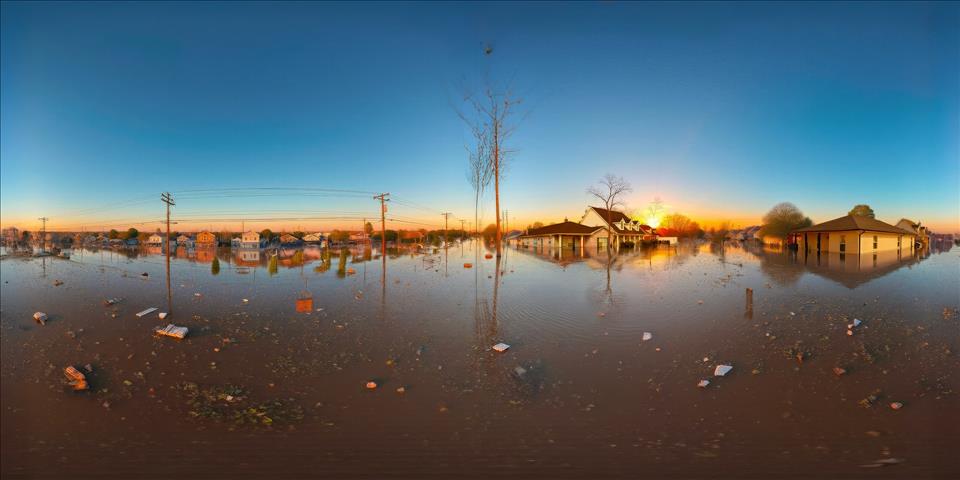
A New Online Game Helps Imagine Life On Earth In 2100
Players are shown an image from the future and asked to guess the location. Information is revealed about how close they are, what the climate change consequences would be, what will happen if no action is taken and how things could be different.
Available to play in English and French, the game takes inspiration from GeoGuessr, the online geography game that has enabled millions of people to travel virtually from their phone and guess where they are. FutureGuessr uses pictures to give users a visual representation of how familiar landscapes will look in 2100 as a result of climate change.
Drought in 2100 Germany as imagined by computer game FutureGuessr. Artefact 3000 / Réseau Action Climat
FutureGuessr is part of a broader trend in the use of games in climate communication. Creative board games and video games can reach diverse audiences and communicate climate change in serious, playful, thought-provoking and surprising ways.
Games played for pleasure, like Game Changers (an online story-based game produced by Megaverse) can generate conversations on climate actions by creating an innovative visual game world and integrating climate change into the plot. Collective decision making in the game allows players to learn and discuss climate change with others.
Our research suggests that this helps players critique corporate power, learn about greenwashing and enjoy an aesthetic experience. In the world of board games, Daybreak challenges players to cooperate and stop climate change by trying out different technical, social and economic projects.
Play with purposeSerious games go beyond entertainment to connect with real-world problems. The most successful ones are fun while engaging with social, environmental and economic issues that players really care about.
Games can support players in thinking about becoming disaster ready and building disaster resilience. A game called The Flood Recovery Game is being used by researchers to identify disaster recovery gaps. It can also help policymakers create more comprehensive strategies to address flooding.
In terms of climate education, interactive in-person game-based workshops like the Climate Fresk already connects millions of people with science from the Intergovernmental Panel on Climate Change (IPCC), the UN body that assesses the science on climate change. These three-hour workshops also enable people to consider how they might act to create positive climate solutions.
Dry riverbed in Botswana in 2100 as imagined by FutureGuessr. Artefact 3000 / Réseau Action Climat
FutureGuessr is a game for pleasure with a serious purpose: to make climate change data visible. Produced in partnership with Résau Action Climat, a network of non-governmental organisations, it shows the negative effects of climate change in familiar locations such as Antarctica and Easter Island.
Read more: How interactive 'climate fresk' workshops are trying to accelerate environmental awareness around the globe
Research on visual climate communication found that images showing climate impacts such as extreme weather and floods moved people, especially when it featured localised impacts. There is a balance to be struck between highlighting local relevance and linking to the bigger picture. Showing the future of recognisable places we care about might be powerful in building support for climate action.
But photographs from the future don't exist. FutureGuessr uses images generated from a bespoke AI model which combines maps with photographs of locations and data from IPCC reports.
This has a cost. The climate cost of the AI revolution is increasingly measured and documented, and image generation is one of the most energy intensive tasks you can do with AI. Experts in computing have called for “frugal AI”: to treat AI as finite, only to be used when necessary, and even then, as effectively as possible.
Chamonix in 2100, as imagined by computer game FutureGuessr. Artefact 3000 / Réseau Action Climat
It is important to consider not just the message, but the medium, and the environmental effects of game production. The Playing for the Planet Alliance has produced a carbon calculator for the industry and offers awards and game jams to support the video game industry to take climate action.
Now that the images have been created, an effective use of FutureGuessr might be to generate conversations about the effects of climate change, and about how research, game design and communication can be carried out in the most environmentally sensitive way.
People won't act just based on facts alone. The development of creative ways to communicate the climate emergency that connect people with why this matters is essential for people and communities. Already, some games are making an increasingly visible contribution to the conversation but we need greater transparency in the environmental impacts of game production, and consideration of how to minimise these impacts through visible commitments to sustainability as modelled by Daybreak.
FutureGuessr demonstrates value of bringing games and visual climate communication together to raise awareness of how climate change affects landscapes everywhere on the planet. We all need to play for the planet. Our research shows that whether played for purpose or pleasure, games can create space for serious conversations about how to tackle climate change.
Don't have time to read about climate change as much as you'd like?
Get a weekly roundup in your inbox instead. Every Wednesday, The Conversation's environment editor writes Imagine, a short email that goes a little deeper into just one climate issue. Join the 45,000+ readers who've subscribed so far.

Legal Disclaimer:
MENAFN provides the
information “as is” without warranty of any kind. We do not accept
any responsibility or liability for the accuracy, content, images,
videos, licenses, completeness, legality, or reliability of the information
contained in this article. If you have any complaints or copyright
issues related to this article, kindly contact the provider above.

















Comments
No comment